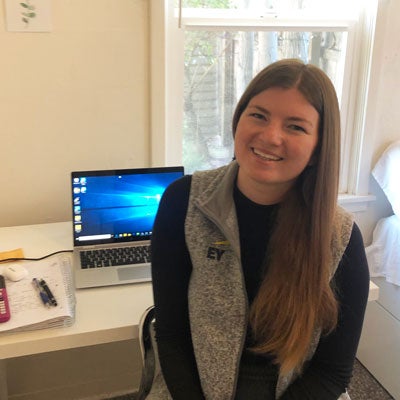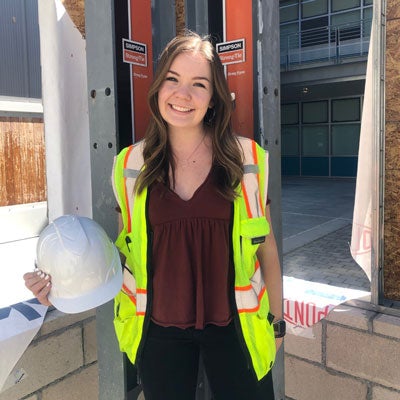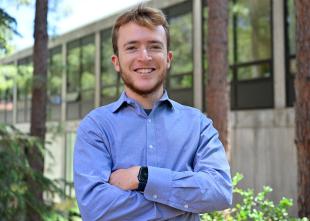What to Do When an Internship Goes Virtual
What does it take to ace a summer internship during a pandemic? A journal, good lighting and a whole lot of humanity.
For many Cal Poly students, summer internships usually mean a chance to test their skills in a professional workplace, network with seasoned professionals and maybe even try living in a new city. But in the face of the coronavirus, these internships and co-ops are presenting a new set of challenges for future professionals to tackle.

Lauryn Westgarth, a business administration senior, is one of many Cal Poly students taking on a professional internship remotely this summer due to COVID-19. She navigates an audit internship with accounting firm EY from the comfort of her sunlit bedroom in San Luis Obispo. Each day is a mesh of Zoom calls, new tasks and professional development curriculum.
For a future accountant like her, the third-year internship is an essential step in landing a full time offer in the fall. She’s not alone: roughly 12% of Cal Poly undergraduates use internships to find employment, according to the most recent Graduate Status Report.
Cal Poly Career Services estimates that about 70% of internships are still happening despite the pandemic, outside of hard-hit industries like entertainment and tourism. The majority of internships that continued have gone virtual. And those co-ops often have abbreviated timelines — work that would have lasted two or three months is now taking place across three or four weeks.
Travis Raynaud, career counselor in Career Services, has talked to students about how to make the most of an internship that has taken such a different shape. He says the remote work format can be a plus, empowering some to broaden their network within a company.
“Individuals who you historically wouldn’t have access to because they’re not on site, now you’re part of their network and part of their team, so it’s easier for you to have those coffee chats or virtual chats,” said Raynaud. He encourages students to conduct informational interviews to understand a professional’s career path, their work routine, and how their role has changed since stay-at-home orders were issued.
Raynaud also advises students to thoroughly document their tasks, skills and successes. A written record can help students remember specific accomplishments and better determine if they enjoyed their experience.
“When you’re on site, it’s a lot easier for your internship supervisor to see the work that you’re doing because you’re there together, but it’s a little harder virtually,” says Raynaud. “We’ve talked to students about a digital portfolio, an excel spreadsheet or just a simple journal they’re keeping, just to keep record of all the things that they’re completing.”
Westgarth, who is about half way through her condensed four-week accounting internship, is reveling in the chance to work during auditing’s “busy season” with a client that completed its fiscal year at the end of June. She connects daily with a supervisor and navigates a handful of different tasks before logging off for the evening.
“The tasks are always pretty different and involve learning something entirely new,” she Westgarth. “It's fun to see all the things I've learned about in class in real life.”
While she regrets missing her chance to live in San Francisco for the first time, she stays energized by connecting with fellow interns over lunchtime Zooms and learning directly from her supervisor.
“The individuals who most successfully navigate the transition from in person to virtual, [they] will stand out as the most adaptable and flexible, therefore the strongest candidates for full time positions,” says Raynaud.
Marisa Martineau, an architecture senior, has some advice for her fellow virtual interns. She dove into remote work creating renderings for Fougeron Architects in the spring, just after the COVID-19 pandemic emptied many offices.
Martineau landed the opportunity by reaching out the firm, where she worked last year, because she was concerned about her colleagues.
“When you’re trying to network, reach out to people not just when you need something, but to reach out and kind of check in to [maintain] that relationship,” she said. “You can show concern and show caring.”
She also advises eager students to establish strong, clear communication habits in the transition to working from a distance.
“Work is about communication, especially now that we work virtually,” she says. “Don’t expect someone to read between the lines, and don’t read between the lines [yourself].”
She also suggests that students pay attention to their at-home work space to enhance productivity.
“Remember that it might not necessarily be you that’s lacking in motivation or in drive or lacking in concentration, it could just be your environment,” she said, adding that abundant natural light, a dedicated work space and a set time to unplug have helped her stay on task.

In other industries, some virtual internships have led to in-person work opportunities. Chloe Stevens, a construction management senior and a student ambassador for Career Services, is working on site for Menemsha Solutions in Southern California. After a virtual internship in spring quarter assisting a project manager, she’s now a site superintendent overseeing all work on a job site. She is excited by the responsibility in her new role.
“I have learned so much in my classes, but now I get to apply that to the real world and watch a building come to life.”
Her daily routine includes a spectrum of coronavirus precautions, like wearing masks, checking temperatures, and regulating who is permitted onsite. Despite the extra steps, she sees the value of her virtual work habits pay off, including constant communication with her superiors. But whether things are virtual or in-person, Stevens aims to never lose a sense of humanity at work.
“While making sure to be on top of responding and staying updated, it is also important to be patient and understanding,” she says. “We are all having to adjust and do things differently. Each one of us is working through it in their own way, and patience is what will help everyone get through this together.”




